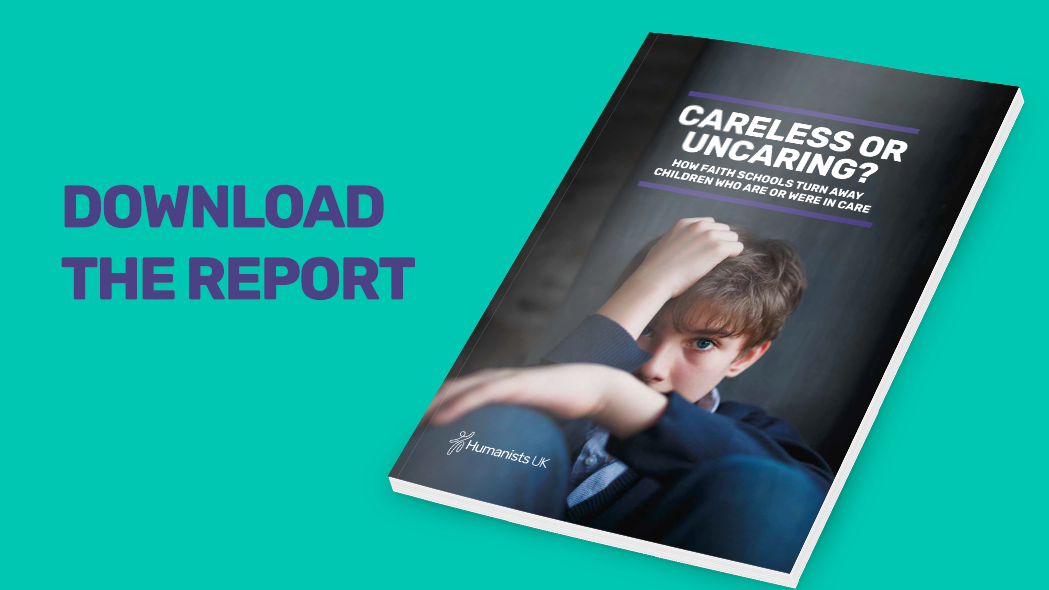 Religious state schools routinely de-prioritise children who are or were in care in their admissions policies, by making use of their powers to select pupils on faith grounds. That’s the finding of a new report from Humanists UK.
Religious state schools routinely de-prioritise children who are or were in care in their admissions policies, by making use of their powers to select pupils on faith grounds. That’s the finding of a new report from Humanists UK.
The report – Careless or uncaring? How faith schools turn away children who are or were in care – finds the problem is particularly acute in Catholic and Jewish schools. At secondary school level, 76% of the former and 100% of the latter discriminate in this way.
The School Admissions Code sets out rules about which pupils state schools in England must prioritise for admission. It requires all schools to prioritise children who are or were in care. Such children are formally known as ‘looked after’ and ‘previously looked after’ children. This is to make sure the most vulnerable children in society, many of whom have complex and poorly met needs, are able to access school places easily. But faith schools have a unique exemption from this rule. If they choose to, they can prioritise all children who ‘share the faith of the school’ over children who are or were in care but who do not. In other words, faith schools are allowed to relegate highly vulnerable children to the point that they won’t gain admission.
After a comprehensive study of the admissions policies of every state-funded secondary school in England, Humanists UK found that:
- 41% of all secondaries of a religious character discriminate against children who are or were in care ‘not of their faith’
- But 92% of the schools that discriminate in this way are Catholic. 76% of Catholic secondaries discriminate against children who are or were in care ‘not of their faith’
- 100% of Jewish secondaries also discriminate against children who are or were in care ‘not of their faith’
- 16% of Muslim secondaries discriminate against children who are or were in care ‘not of their faith’
Other types of faith school do much better:
- Only 1% of Church of England secondaries discriminate against children who are or were in care ‘not of their faith’
- No other Christian, Sikh, or Hindu secondary discriminates against children who are or were in care ‘not of their faith’.
Humanists UK does not believe that the state should fund religious schools because, amongst other things, the evidence shows they not only segregate by religion, but also by ethnicity, and parental wealth, and therefore work against social cohesion. Releasing today’s research, it has said the discrimination against children who are or were in care is especially shocking.
Humanists UK Chief Executive Andrew Copson commented:
‘When faith schools were exempted from the duty to prioritise vulnerable children over those whose parents happen to share the faith, we opposed it. Today’s research shows we were right to do so.
‘The Catholic Church particularly claims that it has ‘a special mission to care for the poorest and most vulnerable’. Yet, Catholic schools are amongst the most discriminatory. Indeed, only Jewish schools are more likely to discriminate in this way.
‘State schools should not be permitted to create a religious hierarchy in who they admit, and certainly not to shut out the most vulnerable and disadvantaged. The Government should amend the School Admissions Code to make all schools prioritise these children regardless of their parents’ religion.’
In May, the UK Government published its response to a public consultation on changes to the School Admissions Code. These changes were designed to improve school access for disadvantaged children. It received 1,160 responses commenting on ‘the ability of schools with a designated religious character to admit children on the grounds of their religion or belief’. And ‘a large number of these raised concerns about faith schools who choose to prioritise children of the faith over looked after and previously looked after children not of the faith’. However, the Government did not engage with the criticism. Instead, it said only that it ‘remains committed in its support for church and other faith schools’. It is for ‘the admission authority of those individual faith schools to decide whether or not to adopt these arrangements’, it concluded.
Download the report
Read Careless or uncaring? How faith schools turn away children who are or were in care.
Notes:
Poor access to the most suitable school place is clearly not the only difficulty children who are or were in care are likely to face. This report seeks to focus solely on ensuring care leavers can have privileged access to all state-funded schools because of our long-standing expertise regarding school admission arrangements and because there is already a wide consensus that care leavers should enjoy this advantage.
The report does not consider the failings of the religious care system. It is however indicative of the lowly consideration currently being given towards children who are or were in care by many state-funded faith schools that none of the admission policies we looked at mentioned or provided privileged access to children who have been in the care of an organisation of the same religion or denomination.
For further comment or information, please contact Humanists UK Education Campaigns Manager Ruth Wareham via ruth@humanists.uk or call 020 7324 3000 or 0772 511 0860
Read the full report.
Read our most recent article on the UK Government ignoring calls to stop faith schools refusing to admit children in care.
Read the UK Government’s School Admission Code consultation response.
Read our original article about the consultation.
Read our recent article on the CofE and Board of Deputies anti-racism reports that overlook faith school admissions.
Read our article on why pandemic policies on faith school admissions show they should be scrapped altogether.
Read Humanists UK’s Manifesto for inclusive schools.
Read more about our work on faith schools and religious selection.
Humanists UK is the national charity working on behalf of non-religious people. Powered by 100,000 members and supporters, we advance free thinking and promote humanism to create a tolerant society where rational thinking and kindness prevail. We provide ceremonies, pastoral care, education, and support services benefitting over a million people every year and our campaigns advance humanist thinking on ethical issues, human rights, and equal treatment for all.
In 2021, Humanists UK is celebrating its 125th anniversary with a renewed focus on its history. The new website Humanist Heritage is a rich new web resource that uncovers the untold story of humanism in the UK – a story of people, groups, objects, places, movements, publications, and ideas.

